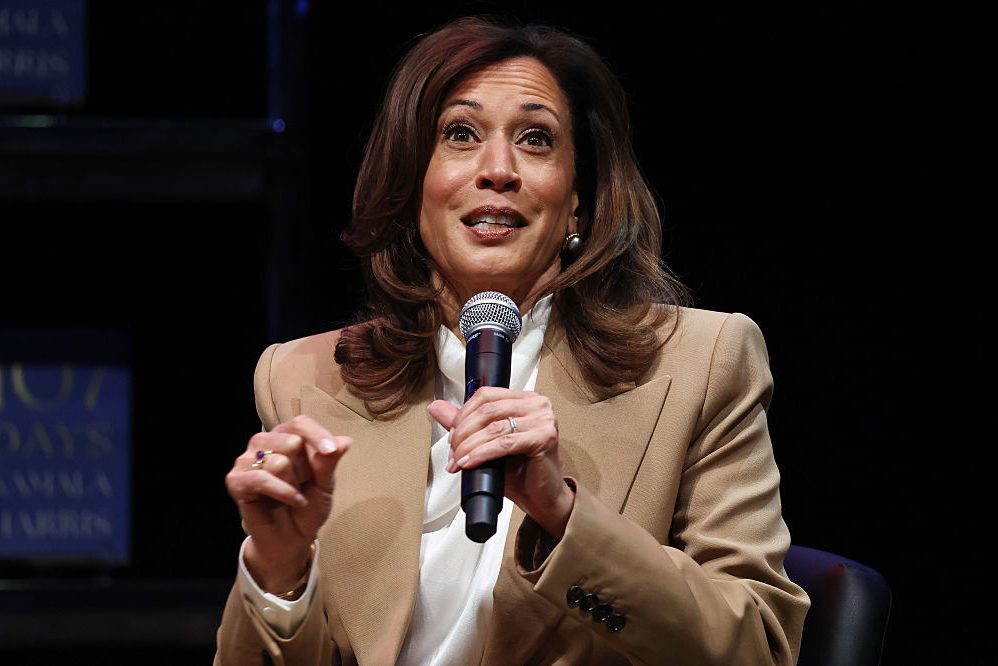Toward the end of 107 Days, Kamala Harris appears on something called The Checkup podcast. Though she was meant to be having a short interview about RFK Jr., the host suddenly asks if the then vice-president could talk on the hoof a bit about some of her star issues: healthcare costs, women’s health, and healthy meals for children. Alarmed, Harris fumbles for her “briefing sheet.” For any media appearance Harris requires one of these sheets, listing the questions to be asked and the answers to each of them. It isn’t there. After the interview she yells at her staff.
The ancients used to warn that democracy would lead to the rule of silver-tongued demagogues who would promise the mob anything. In fact, it has been a good deal worse than that. What often seems like the closing years of liberal democracy have instead given us a set of garrison politicians with neither an eye for detail nor a gift of the gab – a series of shuffling figures with no discernible agenda.
This is a strange interior world that manages to be both deeply cynical and deeply naive
The hour feels late in 107 Days – and not just because of the looming election. Decisions are made by shadowy brokers in hidden rooms, rooms our hero is seldom in. The vice-president is, by her own telling, a cipher for her advisors, who feed her “treats” of Doritos when she pleases them. Harris gains the nomination for the presidency through a palace intrigue, after Joe Biden’s infirmity is finally exposed. Her first thought is that his advisors should have done a better job at concealing it. There is vainglorious talk from then-House Speaker Nancy Pelosi and others about how Biden has no obligation to debate a convicted felon like Donald Trump. This is a strange interior world that somehow manages to be both deeply cynical and deeply naive, and it is fitting that this vague and giggling figure should be its final spokesman.
By the middle of the Biden presidency it is a world that is clearly in decay. There is a Byzantine air to everything, a sweet-smelling rot. Dark, anti-democratic forces are said to be on the march, yet Harris recounts her first three years as VP entirely in terms of her personal feud with an increasingly senile Biden. Their spats are not over any question of policy or how to take the fight to the populists, but concern narrow court matters of turf wars and order of precedence. When Harris is seen to fail in her role as “border czar,” it’s because she was setup by the Biden camp to make her look bad, rather than a foretaste of the issue that will end up costing them the election, and – presumably – the republic. This seraglio atmosphere is reinforced by the structure of the book. The narrative is fragmentary, with an unclear chronology and long, looping flashbacks, as if things are being seen through a haze of incense.
Outside, the wider Establishment machine is seizing up. The slogans don’t make sense anymore. It is all strange verbiage like “Real men vote” and “When we fight, we win.” Silicon Valley, the Washington Post and Gavin Newsom are cutting separate deals or staying away. There is an air of despairing bacchanalia at events like the Democratic National Convention, whose delegate rollcall Kamala decides to turn into an impromptu dance party, or at an early Atlanta rally, where the backup dancers for the rapper Megan Thee Stallion come out dressed in the VP’s trademark blue pantsuits. “A witty nod to my style, even though theirs were of a cut and fit very different from the kind I wear,” she adds bathetically. Who is inside the pantsuit? Kamala Harris is overfamiliar but also nebulous. In the middle of her 2020 campaign for the presidency she holds an all-staff meeting to decide what her worldview ought to be. She is certainly not a social democrat on the Bernie pattern but nor is she really a hardcore Russiagater à la Keith Olbermann. Insofar as she has a fixed belief system these are the assumptions of the TV show The View: homespun wisdom, complacent spiritualism, therapy-speak, plus a general air of mutual exculpation.
Harris, for her part, was always the show’s toy attorney. Like most late-stage functionaries she has a reverence for procedure, but her mental universe begins and ends with self-helpisms. The candidate herself informs us that she is “edgy, imperfect, confident, embracing.” She is advised by an early mentor to “walk out there [onto the stage] like you bought that podium. You own it. It’s your podium.” An elderly gentleman “pulls her aside” and warns her: “Baby, don’t make it look too easy.” After November 2024, she seems to look back on the election chiefly as a stage in her own journey of self-discovery, including in her book a quote from former White House aide Minyon Moore that “God gave you a beautiful 107 days to reclaim who you are. You have been able to push back against the caricatures […] and be yourself.” The epigraph to this book, a Kendrick Lamar lyric, implies that our subject “got loyalty, got royalty inside my DNA… I was born like this.” Harris is an example of the strange frivolity that can overtake an Establishment in its decline.
The best that can be said of Kamala Harris is that she was not really central to anything
Lacking the subtlety of her predecessors, Harris hits on the following idea. Her allies control nearly all society’s ruling institutions. Why not simply remind people of this? In August 2024, this becomes the main thrust of Harris’s campaign. It would not bother with policy, or any of the usual gloss put on pro-Establishment politics; it would merely assert a social consensus and then challenge people to stand outside it. She relied on that contemporary fallback, browbeating the public with celebrities. The first of these appears soon after Kamala launches her campaign and the pages soon crawl with them. Katy Perry, Lady Gaga, Beyoncé, U2, Stevie Wonder, Bon Jovi – these people appear here as smiling gods. Oprah emerges as a consigliere and sage, making a series of surprise appearances to offer spiritual advice of an enigmatic kind.
Again, there is a garrison quality to these people. Most Americans now secretly hate celebrities and relish their misfortunes, but to Harris these figures really do represent the collective moral authority of society. It is from this milieu that we also get the term “vibes,” the supposed wordless movement of the masses towards consensus – which Team Harris is the first to use as a phrase. The strategy heralds the arrival of Governor Tim Walz, gruesome legate of the old society. His only argument is to wield the threat of social ostracism, that anyone unhappy with the way things are is “weird.”
In a sense Walz is right. Populist causes such as MAGA are never actually popular. Most people err toward the status quo and resent those who seek to disrupt it. Nothing like a majority of people will ever be in favor of turning society upside down. Yet this is not enough. Callow, late-stage figures such as Harris and Walz believe that social order is something that merely needs to be asserted. Their wiser forerunners could have told them that society always needs to justify itself anew, that it can never simply rely on the inertia of the majority.
Throughout 107 Days there is no sense of a national debate going on, no phrases, no policies, no real attempt to rouse the present order in its own defense. It never occurs to Harris that the status quo might need to offer people something in exchange for their support. Her constant refrain is that she did not have enough time to mount a proper run. But she had been a frontline politician for 20 years. Could she really not have slicked back her hair, flashed a grin, and said something eloquent? Or at least promised the voters something? In Harris we see the atrophy of those instincts that keep a ruling class going. It is the fate of every Establishment to eventually forget the hard-edged methods by which it is maintained.
Toward the end of the book the narrative shrinks to Harris and a small knot of advisors. She frets about height differences when she’s being photographed, quibbles about lighting, gripes about being “mischaracterized.” Meanwhile history seems to be on the move. A swath of the American ruling class is in open mutiny, young people are changing sides en masse, the operation used to “fortify” the last election is going haywire. While this is happening U2, “one of my favorite bands,” sings Kamala “Happy Birthday.” An aide asks her why nothing seems to be working. She doesn’t know.
The best that can be said of Kamala Harris is that she was not really central to anything. There is none of the divine madness of, say, Hillary Clinton here. The vice-president was a machine politician when the machine stopped working. Harris repeats the usual phrases about threats to democracy but to her they are just that – phrases. There is no real belief here – for her it all became a racket a long time ago. The general impression in 107 Days is one of listlessness, torpor, a failure to really grasp the stakes of what’s happening. Our hero always seems to be in a sort of reverie, which nothing short of the end of the world could ever shake her from. As a result, the unqualified form of “woke” that persisted from 2015 until last year never really gets its fight to the finish. It simply deflates. The giggling, star-studded, Ouija board-consulting Kamala campaign only ends up clearing the way for the second election of Donald Trump. That really was the end of a world.
This article was originally published in The Spectator’s October 27, 2025 World edition.























Leave a Reply